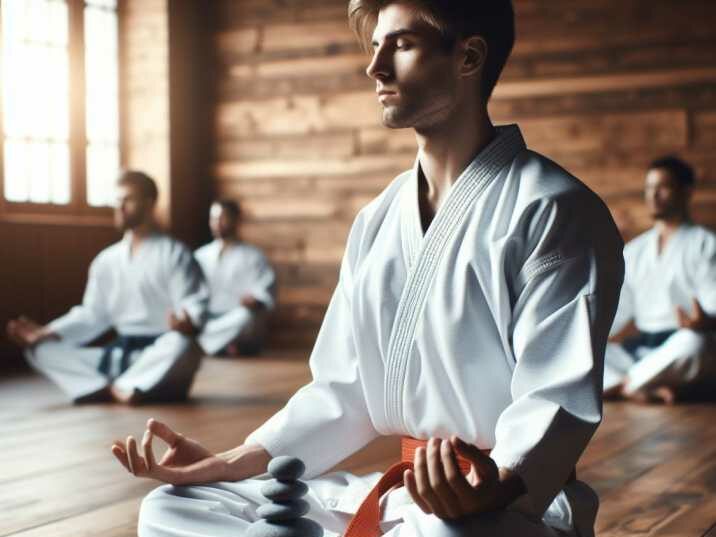Introduction:
Table of Contents
In today’s fast-paced world, stress has become an inevitable part of life for many people. From tight deadlines to personal challenges, stress can creep in and affect our overall well-being. However, there are various methods to combat stress, and one particularly effective way is through Karate training. In this article, we’ll explore how the practice of Karate can aid in stress management and promote a healthier lifestyle.

Benefits of Karate Training for Stress Management:
1. Physical Exercise:
One of the primary ways in which Karate training helps in stress management is through physical exercise. Engaging in regular physical activity is known to release endorphins, also known as “feel-good” hormones. These endorphins help to reduce stress levels and promote a sense of well-being. Karate training involves a combination of cardio, strength training, and flexibility exercises, making it an excellent way to keep both the body and mind in top shape.
2. Focus and Mindfulness:
Karate is not just about physical strength; it also emphasizes mental discipline and focus. During training sessions, practitioners are encouraged to concentrate on their movements, breathing, and surroundings. This focus on the present moment, similar to mindfulness meditation, can help reduce anxiety and promote a sense of calmness. By learning to be fully present in the moment, individuals can better manage stressors and avoid getting overwhelmed by worries about the past or future.
3. Stress Relief Through Physical Contact:
Karate involves various forms of physical contact, such as sparring and partner drills. While this may sound intimidating to some, these activities can actually be incredibly therapeutic for stress relief. Physical contact releases oxytocin, often referred to as the “cuddle hormone,” which promotes feelings of trust, bonding, and relaxation. Engaging in controlled physical contact during Karate training can help individuals feel more connected to others and reduce feelings of loneliness or isolation, common triggers for stress.
4. Self-Confidence and Empowerment:
Another significant benefit of Karate training for stress management is the boost in self-confidence and empowerment that it provides. As individuals progress in their training, mastering new techniques and overcoming challenges, they develop a greater sense of self-esteem and belief in their abilities. This increased confidence can help individuals better cope with stressors in their lives, as they feel more capable of facing and overcoming obstacles.
5. Outlet for Pent-Up Emotions:
Stress often manifests in the form of pent-up emotions such as anger, frustration, or sadness. Karate training offers a healthy outlet for these emotions, allowing practitioners to channel their energy into constructive physical activity. Instead of bottling up their feelings, individuals can release tension through punches, kicks, and other movements, leading to a sense of emotional release and relief.
6. Sense of Community:
Many Karate dojos (training facilities) foster a strong sense of community among practitioners. Being part of a supportive community can have a profound impact on stress management, as individuals feel a sense of belonging and connection. Sharing experiences, challenges, and successes with fellow practitioners can provide valuable emotional support and perspective, helping individuals navigate through stressful times with greater resilience.
7. Discipline and Time Management:
Karate training requires dedication, discipline, and consistent practice. By adhering to a regular training schedule and setting goals for improvement, individuals develop better time management skills and a stronger sense of discipline. This structured approach to training can spill over into other areas of life, such as work or academics, helping individuals better prioritize tasks and manage their time effectively, thereby reducing stress levels.

Table of Information:
| Benefits of Karate Training for Stress Management |
|---|
| Physical Exercise |
| Focus and Mindfulness |
| Stress Relief Through Physical Contact |
| Self-Confidence and Empowerment |
| Outlet for Pent-Up Emotions |
| Sense of Community |
| Discipline and Time Management |
Conclusion:
In conclusion, Karate training offers a holistic approach to stress management, addressing both the physical and mental aspects of well-being. Through regular practice, individuals can reap the benefits of improved physical fitness, enhanced focus and mindfulness, stress relief through physical contact, increased self-confidence, emotional release, a sense of community, and better discipline and time management skills. Whether you’re looking to relieve stress, boost your confidence, or simply stay fit and healthy, Karate training provides a comprehensive solution for overall well-being.
FAQs:
1. Can anyone practice Karate, regardless of age or fitness level?
- Yes, Karate is suitable for people of all ages and fitness levels. Beginners can start at their own pace and gradually progress as they build strength and skill.
2. Is Karate training safe, especially for beginners?
- Yes, Karate training is generally safe when practiced under the guidance of a qualified instructor in a controlled environment. Safety protocols are in place to minimize the risk of injury.
3. How often should I practice Karate to experience the stress-relieving benefits?
- Consistency is key. Aim to practice Karate regularly, ideally several times a week, to experience the full range of benefits for stress management.
4. Can Karate training help with other mental health issues besides stress?
- Yes, Karate training has been shown to benefit various mental health conditions, including anxiety, depression, and PTSD, by promoting physical fitness, mindfulness, and self-confidence.
5. What equipment do I need to start Karate training?
- To begin Karate training, you’ll typically need a gi (uniform), a belt (to indicate your rank), and protective gear such as gloves and shin guards for sparring. Your instructor can advise you on any additional equipment required based on your training goals.


